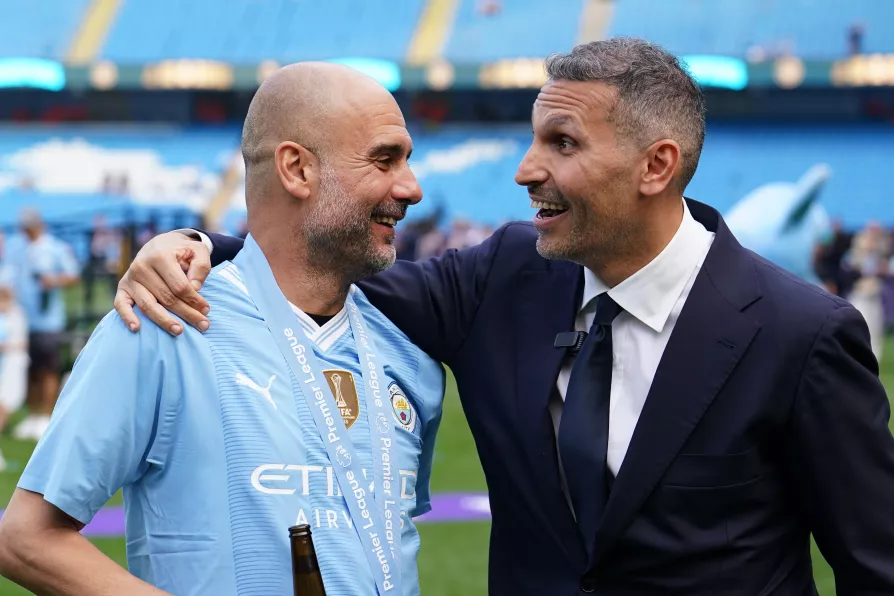
 Manchester City manager Pep Guardiola (left) with club chairman Khaldoon Al Mubarak, May 19, 2024
Manchester City manager Pep Guardiola (left) with club chairman Khaldoon Al Mubarak, May 19, 2024
MANCHESTER CITY caused ructions this week after light was shed on the club’s decision to challenge the Premier League’s rules on associated party transactions.
In doing so they have further exposed the so far futile attempts to control top-level football’s increasing role as a pawn in the jostle for position by various capitalist entities on the global stage.
When the Premier League updated its rules on associated party transactions in February of this year, Man City decided to take legal action, the details of which emerged in a report by the Times on Tuesday.
The club believe the rules, which are designed to prevent inflated sponsorship and commercial deals from companies with links to club owners, are anti-competitive.
It appears that Man City want to be able to name their own price for commercial and sponsorship deals with companies linked to their club’s owners in Abu Dhabi.
They aren’t the only club that would like to get away with such shenanigans, as deals like this can potentially help clubs avoid sanctions by the Premier League related to financial fair play or their profitability and sustainability rules.
This season, Everton and Nottingham Forest have fallen foul of those profitability and sustainability rules and were docked points as a result.
Everton previously had to end sponsorship deals with Russian businessman Alisher Usmanov following Russia’s invasion of Ukraine, including sponsorship of Everton’s training ground by Usmanov’s USM Holdings and future stadium naming rights.
Similarly, Chelsea had to seek new owners after Russian businessman Roman Abramovich was disqualified from being able to own a Premier League club after being sanctioned by the UK government on the back of Russia’s actions.
In the cases of Everton and Chelsea here, these issues came about due to government sanctions rather than any Premier League rules.
Fast forward to the present day, and Chelsea were revealed to have sold a hotel to Blueco 22 Properties Ltd, which is also under Chelsea’s holding company, Blueco 22 Ltd. The club effectively sold a hotel to itself to get around financial fair play rules.
There appear to be double standards across the Premier League when it comes to who is allowed to own Premier League clubs, who are allowed to sponsor them, and what constitutes an associated party transaction.
Surely Chelsea moving assets between related companies is no different to UAE state-owned companies funding Manchester City.
Meanwhile, Liverpool’s training ground sponsor AXA which has sponsored the club to varying levels since 2019, has invested in Israeli banks and the Israeli military equipment manufacturer Elbit Systems, though has heavily divested from these in recent years and now says it has no investment in Israeli banks, whether directly or indirectly.
It seems there has been deemed enough indirectness and degrees of separation between AXA’s contributions to Israel’s ongoing assaults on Palestine to not see them considered in the same light as USM Holdings and its links by however many degrees of separation to Russia’s invasion of Ukraine.
While Russian sponsorship and ownership of Premier League clubs is effectively banned, Saudi owners have been waved through by the government and the Premier League despite the country’s actions in Yemen and on its borders.
Meanwhile, the UK and US continue to supply Israel with weapons for its genocide in Gaza. The Premier League is now primarily a league competition held in the UK run to an increasing degree by US investors.
The business of football further reveals the general murkiness of how large companies operate within the capitalist system and how connected many of them are to atrocities around the globe with varying degrees of separation.
Even the independent regulator in its latest proposed design would not prevent things like state ownership.
With its closer links to government, the regulator might be even more susceptible to the political whims and geopolitical manoeuvring of the government of the day.
As the Premier League goes to battle with its clubs, and the clubs go to battle with the Premier League — effectively Premier League vs Premier League given the clubs are the league — club football at the top level is eating itself, and what is allowed and what isn’t, and why, is becoming increasingly inconsistent.

Fan group The 1873 issues scathing response to owners’ statement saying the club will not close













